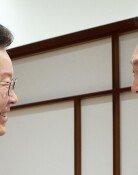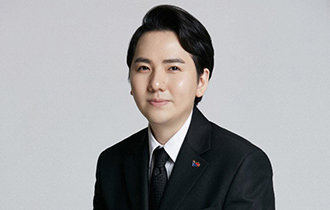Japan to Use Foreign Workers to Help Aging Society
Japan to Use Foreign Workers to Help Aging Society
Posted May. 29, 2008 08:59,
If things remain the same, Japans population will fall from 120 million to 90 million in 50 years, a Japanese think tank for population policy said. In particular, the economically active population will only comprise 51.1 percent of the population.
Japan, which has long been dogged by a dearth of talent, is set to fully open its doors to foreign labor to shore up its workforce. There is also a growing voice to let in ordinary laborers instead of just technicians and professional workers.
▽ Foreign workers to help Japans low birth rate
Do you think Japanese society can be maintained as it is now? It cannot. Thats the reason why we should bring in overseas talent, said former Liberal Democratic Party Secretary General Hidenao Nakagawa at a May 15 meeting held by an association for foreign talent exchange under the ruling LDP.
With some 80 political heavyweights including former Prime Minister Yoshiro Mori in attendance, the meeting highlighted how seriously Japan is handling the issue.
Based on measures discussed at the meeting, they plan to submit a set of proposals to the government in June. Some of the measures are radical enough to surprise ordinary Japanese.
One is to set up an immigration agency to handle foreigner affairs, which ministries are handling. Another is to create a European Union-style multiethnic society in which immigrants account for 10 percent of the population.
Former Japanese Justice Minister Jinen Nagase, who suggested introducing foreign workers in May last year, established a task force on the issue under the LDPs center for national strategy in January this year. He is expected to propose a temporary employment program to allow foreign workers to join the Japanese labor market. But the program limits the number of workers and the sojourn period to three years, which are deemed more restrictive than those suggested by the association.
▽ Interests of Japanese workers come first
Under Japanese law, only foreign nationals in specialized professions such as college professors, physicians and athletes can be employed. Tokyo is reluctant to allow in overseas workers to perform simple jobs.
The Health, Labor and Welfare Ministry has expressed skepticism over allowing in ordinary laborers, saying, It will drive down the wages of domestic workers. The ministry says Japan will see growing education and security costs with more foreign workers.
The Justice Ministry, however, which is responsible for immigration, is reportedly gearing up for a large influx of immigrant workers. The ministry proposed in a meeting for immigration policy in late March that it manage all personal information on foreign workers by using an integrated data card.
To support its case, the ministry will submit a revised immigration law to parliament next year. If implemented, it will also help the government ferret out illegal aliens.
▽Foreign workers a must for 3-D industries
Behind the Japanese governments turnabout is the perception that the 3-D (dirty, dangerous and difficult) industries have long been the territory of foreign workers.
According to the Health Ministry, the number of foreign laborers allowed to work in Japan reached 370,000 in 2006, up 140,000 from a decade ago. Most of them are working at factories as outsourced workers. Foreign apprentices have seen their numbers quadruple over a decade, becoming necessities for Japans machinery and textile industries.
Even convenience stores and sushi chains cannot stay afloat without foreign part-time workers. Japanese aged 75 or more will number 21 million in 2030, double the figure now. Some say an additional 1.9 million caregivers will be needed for the growing number of the elderly. Against this backdrop, Japan is busy importing overseas nurses and hospital caregivers from Southeast Asian nations such as the Philippines and Indonesia.
sya@donga.com
Headline News
- Gov’t faces criticism over policy reversals and decision-making processes
- Controversy erupts over ‘single life’ welfare packages
- Gov’t announces worker protection measures for heat waves
- Madonna wearing Kahlo’s items faces controversy over special treatment
- Pirates' Bae Ji-hwan pulls off a stunning come-from-behind victory







